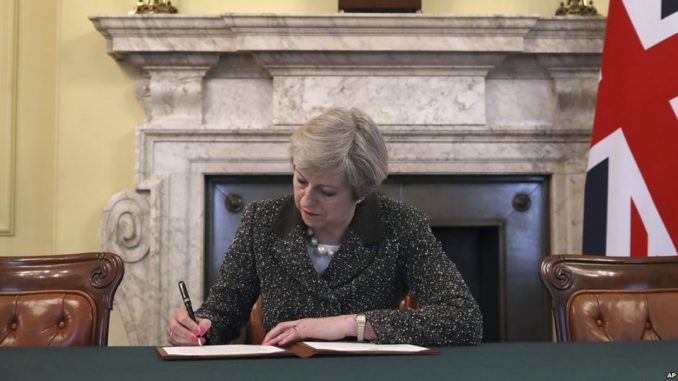
Thousands of EU laws on everything from workers’ rights to the environment are to be scrapped or replaced with UK equivalents in a new plan.
Details of the planned Great Repeal Bill have been published – the day after the UK officially began the two year process of leaving the EU.
Ministers need to effectively “copy and paste” EU laws into UK law to avoid a legal “black hole” when Brexit happens.
It comes as ministers reject claims of a row with the EU over future security.
In a statement to MPs, Brexit Secretary David Davis said the repeal bill would allow businesses to continue operating on the day after UK leaves the EU “knowing the rules have not changed overnight”.
It also meant workers’ rights, environmental protection and consumer rights currently enshrined in EU laws would continue when Britain left, he added.
The bill will “end the supremacy” of EU law in the UK, “delivering” on the result of last year’s referendum, he added.
“Our laws will then be made in London, Edinburgh, Cardiff and Belfast and interpreted not by judges in Luxembourg but by judges across the United Kingdom,” he told MPs.
Mr Davis said the repeal bill will not give the European Court of Justice a “future role” in the interpretation of UK laws, and UK courts will not be obliged to consider cases decided by the ECJ after Brexit.
But UK courts will be allowed to refer to ECJ case law “as it exists on the day we leave the EU” and it would have the same status as Supreme Court decisions, which can be overturned by subsequent rulings.
‘A unique challenge’
The Great Repeal Bill, which Theresa May has said will make the UK an “independent, sovereign nation”, would:
- Repeal the European Communities Act, which says EU law is supreme to the UK’s
- Ensure the UK leaves the jurisdiction of the European Court of Justice
- Transpose existing EU legislation into domestic UK law
- It would come into force the day the UK leaves the EU
- The Commons library anticipates it will be “one of the largest legislative projects ever undertaken in the UK”
- A Lords committee described it as a “unique challenge”, with EU law having accumulated over decades
The repeal bill proposes that after Brexit the UK Parliament, and the devolved administrations in Scotland, Wales and Northern Ireland, would be able to amend or scrap what will be new UK – rather then EU – laws.
Mr Davis also addressed concerns about the UK government’s plans to change up to 1,000 pieces of these previously EU laws without full Parliamentary scrutiny – dubbed “Henry VIII” powers by critics.
Any laws changed in this way would be time limited, he said, and any problems “we have missed will be put right”, he told MPs.
Labour leader Jeremy Corbyn has said Labour – which is backing Brexit – will oppose these “essentially dictatorial powers”.
Lib Dem chief whip Tom Brake said: “If needed, we will grind the government’s agenda to a standstill, unless proper and rigorous safeguards are given over the Great Repeal Bill. The ball is now in the prime minister’s court.
“Liberal Democrats will fight to maintain the high standards for the environment, health, safety, consumer protection, employment and equalities that the UK currently adheres to as an EU member.”
The SNP’s Europe spokesman Stephen Gethins said: “It strikes me that the government has pushed the big red button marked Brexit with their fingers crossed and very little idea of what comes next.”
Mr Davis earlier hit back at claims the UK was trying to “blackmail” the EU by raising security issues ahead of Brexit talks.
In her letter on Wednesday triggering Article 50 of the Lisbon Treaty, Theresa May suggested cooperation with the EU on the fight against crime and terror was at risk if Britain did not agree an overall Brexit deal within the two year time limit.
The prime minister’s words sparked an angry reaction from some EU officials who said security was too important to be used as a bargaining chip in trade negotiations.
But Mr Davis told BBC Radio 4’s Today programme “this is not a threat”.
“This is a statement of the fact that this will be harmful for both of us… if we don’t get a deal. It’s an argument for having a deal.”
He added: “We’re after a fully comprehensive deal that covers trade, covers security, covers all the aspects of our existing relationship and tries to preserve as much of the benefits for everybody as we can.”
Mr Davis, who will be Britain’s chief negotiator in Brussels, said the rights of British expats would the first priority in Brexit talks.
He said Britain had a “moral duty” to end the uncertainty facing Britons living in the EU – and EU citizens living in the UK – as it was not their fault that Britain had voted to leave.
The UK also wanted “to deal with the Northern Ireland border situation early as well”, he added.
He said the “fear” that the EU would punish Britain for leaving, in order to deter other countries from going down the same route, “has reduced” although it had not disappeared altogether.
But he admitted that Britain was in dispute with EU officials over its demand for parallel talks on the terms of Britain’s exit and a deal on trade.

The EU wants to sort out an exit deal – including how much the UK might have to pay to cover its “existing obligations” – before turning to a future trade arrangement but Mr Davis said Britain wanted to “look at the whole package together”.
Over the past 44 years, thousands of rules and directives have been incorporated into British law from Brussels.
The prime minister has vowed to “consult fully on which powers should reside in Westminster and which should be devolved to Scotland, Wales and Northern Ireland”.
She has said that the process will lead to a “significant increase in the decision-making power of each devolved administration”.
The Scottish Parliament will get its own vote on the repeal bill and the UK government is working on the basis that it will need the consent of MSPs to get it through.
Source – BBC
